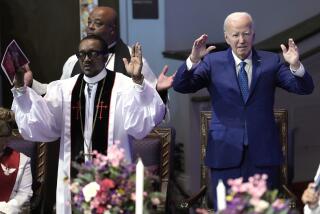Democrats Have First All-Baptist Ticket : Politics: Democratic candidates are moderate members of their denomination. But a move toward fundamentalism within the ranks has divided the church.
- Share via
NEW YORK — Baptists, once a persecuted minority in Colonial America, only twice in history have garnered the U.S. presidency--both in modern times. But Democrats this week tapped two of them for the top offices.
It’s apparently the first all-Baptist presidential slate put forward, said Greg Warner, executive editor of Associated Baptist Press. Gov. Bill Clinton, Democratic presidential nominee, and his vice presidential running mate, Sen. Al Gore, are Southern Baptists, the country’s largest Protestant denomination with 15.2 million members.
Altogether, there are about 28 million Baptists in the United States in about a dozen different branches, but like most Americans their votes don’t regularly go along denominational lines.
Church historian Walter Shurden of Mercer University in Macon, Ga., says being Baptist doesn’t guarantee Baptist votes for Clinton and Gore, but their mutual affiliation is something of a landmark.
“It does at least represent that some Baptists have entered into the mainstream of the cultural and political life of this country,” Shurden said.
That hasn’t always been the case. Not until Harry S. Truman in 1945 became President had a Baptist filled that office, and he was propelled into it from the vice presidency on the death of Franklin D. Roosevelt.
Baptist Jimmy Carter won the office outright in 1976, the first Baptist to do so.
He “sort of broke the ice” for Baptists in national politics, said sociologist Nancy Ammerman of Atlanta’s Emory University. Much ado about his faith, and occasional media puzzlement, put his Baptist traits in the limelight.
Baptists started out in this country as dissenters from established church authorities in the colonies--the Church of England in Virginia and several other Southern colonies and Puritan Congregationalism in New England.
Arrests, floggings and imprisonment were meted out to Baptists and other nonconformists. There were fewer persecutions by 1700, but they continued sporadically for another century.
Baptists, notably the sometimes-imprisoned Virginia preacher John Leland, were key influences in gaining addition of the First Amendment to the U.S. Constitution, rejecting established religion and assuring its free exercise. They have characteristically remained staunch opponents of state tampering with religion.
That separation of government and church, only gradually applied afterward in some states, elevated religious liberty as America’s distinguishing hallmark.
Long a largely rural and small-town people, Baptists hadn’t figured prominently in national politics until recently.
Clinton is a longtime member of Immanuel Baptist Church in Little Rock, Ark., where he sings in the choir when in town.
Gore belongs to Mt. Vernon Baptist Church in Crystal City, Va., just across the Potomac River from Washington. He was born in Washington, the son of a Tennessee senator, but the family home is in Carthage, Tenn.
To what degree their standing among Southern Baptists may be affected by shared affiliation is clouded, particularly since denominational leadership has come under control of a fundamentalist wing.
It insists on a literalist view of Scripture as historically and scientifically without factual error. Moderates, open to varying interpretations of Scripture, have gradually been eliminated from denominational posts.
Clinton, in an interview last week with Bill Moyers on Public Broadcasting System stations, linked himself with the moderate camp and said he’s been saddened by the decade-long feud between the two groups.
“I really hate to see it going on and it’s affected the lives of pastors I know and families I know and churches that I know,” he said. “It’s really been tough on us.
“As you might imagine, I’m pretty much on the side of the moderates in the fight, and the thing that has always been special about our church at its best was its reasoned tolerance and its understanding of the real wall between church and state.”
The ruling fundamentalist group has moved right in its religious and social policies, opposing abortion and women’s ordination and supporting prayers in public school ceremonies.
Both Clinton and Gore support abortion rights.
However, Gore and his wife, Tipper, gained some conservative support in leading a fight in Congress against pornography and violence in rock music lyrics.
Southern Baptist ethicist Robert Parham, a moderate, terms Clinton and Gore “politicians of authentic Christian faith” who represent the Baptist tradition of commitment to “the common good expressed through responsibility for others.”
More to Read
Get the L.A. Times Politics newsletter
Deeply reported insights into legislation, politics and policy from Sacramento, Washington and beyond. In your inbox twice per week.
You may occasionally receive promotional content from the Los Angeles Times.










